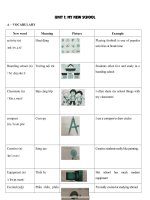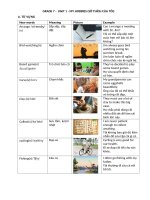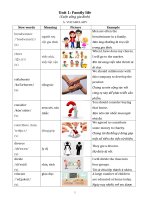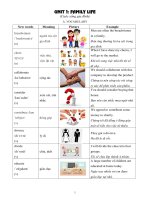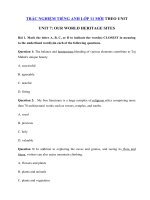Unit 1-Luyện chuyên sâu ngữ pháp và bài tập tiếng anh lop7((HS)
Bạn đang xem bản rút gọn của tài liệu. Xem và tải ngay bản đầy đủ của tài liệu tại đây (331.29 KB, 17 trang )
GRADE 7 - UNIT 1 - MY HOBBIES (SỞ THÍCH CỦA TÔI)
A. TỪ VỰNG
New words
Arrange /ə'reɪndʒ/
(v)
Meaning
Picture
Sắp xếp, sắp đặt
Example
Can I arrange a meeting
with Dr. Jim?
Tơi có thể sắp xếp một
cuộc hẹn với bác sỹ Jim
không?
Jim always goes bird
watching suring his
summer break.
Jim ln ln đi ngắm
chim chóc vào kỳ nghỉ hè.
They’ve decided to play
some board games.
Họ vừa quyết định chơi
cờ bàn.
My grandparents can
carve eggshells
beautifully.
Ơng của tơi có thể khắc
vỏ trứng rất đẹp.
They must use a lot of
clay to make this big
vase.
Họ chắc phải dùng rất
nhiều đất sét để làm cái
bình lớn này.
I am never patient enough
to collect anything.
Tôi không bao giờ đủ
kiên nhẫn để sưu tập cái
gì cả.
Cycling is very good for
our health.
Đi xe đạp rất tốt cho sức
khỏe.
Bird-watching(n)
Ngắm chim
Board game(n)
/bɔ:d//geim/
Trò chơi bàn cờ
Carve(v)/kɑ:v
Chạm khắc
Clay (n)/klei/
Đất sét
Collect(v)/kə'lekt/
Sưu tầm, lượm
nhặt
cycling(n)/'saikliɳ/
Đạp xe
Fishing(n)/'fiʃiɳ/
Câu cá
I often go fishing with my
father.
Tôi thường đi câu cá với
bố tơi.
Hobby(n)/'hɔbi/
Sở thích
Arranging flowers is not
an easy hobby.
Cắm hoa khơng phải là
một sở thích dễ dàng.
Model (n)/moud/
Mẫu, mơ hình
Pottery (n)/'pɔtəri/
Gốm sứ
Skate (v)/skeit/
Trượt, lướt
Take photos (v)
/teik/'foutou/
Chụp ảnh
Take up (v)teik
Bắt đầu (một
thói quen, sở
thích)
Unusual (adj)
/ n'ju: u l/
Lạ thường
The students usually
spend hours making
models.
Học sinh thường dành
hàng giờ đồng hồ để làm
mơ hình.
It is very difficult to make
pottery.
Làm gốm rất khó.
My sister and I really
enjoy skating in our free
time.
Chị tơi và tơi rất thích
trượt ván trong thời gian
rảnh.
He takes photos whenever
he goes travelling.
Anh ấy chụp ảnh mỗi khi
anh ấy đi du lịch.
He has taken up golf
recently.
Gần đây anh ấy bắt đầu
chơi gơn.
She has a very unusual
name.
Cơ ấy có một cái tên rất
lạ.
B. NGỮ PHÁP
I.
THÌ HIỆN TẠI ĐƠN (PRESENT SIMPLE)
1. Cách dùng
Cách dùng
Dùng để diễn tả thói quen hoặc những việc
thường xuyên xảy ra ở hiện tại.
Dùng để diễn tả những sự vật, sự việc xảy
ra mang tính chất quy luật.
Dùng để diễn tả các sự thật hiển nhiên, một
chân lý, các phong tục tập quán, các hiện
tượng tự nhiên.
Dùng để diễn tả lịch trình cố định của tàu,
xe, máy bay,…
Ví dụ
We go to school everyday (Tơi đi học mỗi
ngày)
This festival occurs every 4 years. (Lễ hội
này diễn ra 4 năm một lần)
The earth moves around the Sun (trái đất
xoay quanh mặt trời)
The train leaves at 8 am tomorrow (Tàu
khởi hành lúc 8 giờ sáng mai.)
2. Dạng thức của thì hiện tại đơn.
a. Với động từ “to be” (am/is/are)
I
He/She/It/
Thể khẳng định
Am
+ danh
từ/tính từ
Is
I
He/She/It/
Thể phủ định
Am not
+ danh
từ/tính từ
Is not/isn’t
danh từ số it/
danh từ
khơng đếm
được
You/ we/
are
they/ danh từ
số nhiều
Ví dụ:
I am a student (Tôi là một học sinh)
She is very beautiful (Cô ấy rất xinh)
We are in the garden (Chúng tơi đang ở
trong vườn)
Am
Is
Are
Thể nghi vấn
I
+ danh
từ/tính từ
He/She/It/
danh từ số it/
danh từ
không đếm
được
You/ we/
they/ danh từ
số nhiều
danh từ số it/
danh từ
khơng đếm
được
You/ we/
Are not/
they/ danh từ aren’t
số nhiều
Ví dụ:
I am not here (Tôi không ở đây)
Miss Lan isn’t my teacher (Cô Lan không
phải là cô giáo của tôi)
My brothers aren’t at school (các anh trai
của tơi thì khơng ở trường)
Yes,
No,
Yes,
No,
Yes,
No,
Câu trả lời ngắn
I
Am not
He/She/It/
Is not/isn’t
danh từ số it/
danh từ
không đếm
được
You/ we/
Are not/
they/ danh từ aren’t
số nhiều
Ví dụ:
Am I in team A? (Mình ở đội A có phải khơng?)
Yes, you are / No, you aren’t
Is she a nurse? (cô ấy có phải là y tá khơng?)
Yes, she is/ No, she isn’t
Are they friendly? (Họ có thân thiện khơng?)
Yes, they are/ No, they aren’t
Lưu ý: Khi chủ ngữ trong câu hỏi là “you” (bạn) thì câu trả lời phải dùng “I” (tôi)
b. Với động từ thường “Verb/ V”
Thể khẳng định
I/ You/ we/
+ V nguyên
they/ danh từ số mẫu
nhiều
He/She/It/ danh + V-s,es
từ số it/ danh từ
khơng đếm
được
Ví dụ:
- I walk to school every
morning (mỗi buổi sáng tôi
đi bộ đến trường)
- My parents play badminton
in the morning (Bố mẹ tôi
chơi cầu lông vào buổi
Thể phủ định
+ do not/don’t
I/ You/ we/
+ V nguyên
they/ danh từ số
mẫu
nhiều
He/She/It/ danh + does
từ số it/ danh từ not/doesn’t
khơng đếm
được
Ví dụ:
- They don’t do their homework evry afternoon
(Họ không làm bài tập về nhà vào mỗi buổi
chiều)
- His friends don’t go swimming in the evening
(Bạn của anh ấy không đi bơi vào buổi tối)
- He doesn’t go to school on Sunday (Anh ấy
-
sáng)
She always gets up early
(Cô ấy luôn thức dậy sớm)
Nam watches TV every
evening (Nam xem tivi vào
mỗi tối)
-
Thể nghi vấn
I/ You/ we/
+ V nguyên
they/ danh từ mẫu
số nhiều
He/She/It/
danh từ số it/
danh từ
không đếm
được
Do
Does
không đi học vào chủ nhật)
Her grandparents doesn’t do excersises in the
park (Bà của cô ấy không tập thể dục trong
công viên)
Yes,
No,
Yes,
No,
Câu trả lời ngắn
I/ You/ we/
do
they/ danh từ Do not/
số nhiều
don’t
He/She/It/
Does
danh từ số it/
danh từ
Does not/
khơng đếm
doesn’t
được
Ví dụ:
Do you often go to the cinema? (Bạn có thường đi xem phim vào cuối tuần không?)
Yes, I do / No, I don’t
Does he play soccer in the afternoon? (Có phải anh ấy chơi bóng đá vào cuối buổi chiều
khơng?)
Yes, he does / No, he doesn’t
Do they often go swimming? (Họ thường đi bơi phải không?)
Yes, they do/ No, they don’t
c. Wh-questions.
Khi đặt câu hỏi có chứa Wh-word (từ để hỏi) như: Who, When, Where, Why, Which,
How ta đặt chúng lên đầu câu. Tuy nhiên, khi trả lời cho dạng câu hỏi này, ta không dùng
Yes/No mà cần đưa ra câu trả lời trực tiếp.
Cấu trúc:
Wh-word + am/is/are + S ?
Ví dụ:
Who is he? (Anh ấy là ai?)
He is my brother (Anh ấy là anh trai tôi)
Where are they? (Họ ở đâu?)
They are in the playground. (Họ ở trong
sân chơi)
3. Dấu hiệu nhận biết
Wh-word + do/does + S + V?
Ví dụ:
What do you do? (Bạn làm nghề gì?)
I am a student. (Tôi là một học sinh)
Why does he cry? (Tại sao anh ấy khóc?)
Because he is sad. (Bởi vì anh ấy buồn)
Trong câu ở thì hiện tại đơn thường có sự xuất hiện của các trạng từ chỉ tần suất và
chúng được chia thành 2 nhóm:
Nhóm trạng từ đứng ở trong câu:
- Always (luôn luôn), usually (thường thường), often (thường), sometimes (thỉnh
-
thoảng), rarely (hiếm khi), seldom (hiếm khi), frequently (thường xuyên), hardly
(hiếm khi), never (không bao giờ), regularly (thường xuyên)…
Các trạng từ này thường đứng trước động từ thường, sau động từ “to be” và trợ động
từ.
Ví dụ:
- He rarely goes to school by bus. (Anh ta hiếm khi đi học bằng xe buýt)
- She is usually at home in the evening (Cô ấy thường ở nhà vào buổi tối)
- I don’t often go out with my friends (Tơi khơng thường đi ra ngồi với bạn bè)
Nhóm trạng ngữ đứng cuối câu:
- Everyday/week/month/ year (hàng ngày/hàng tháng/hàng tuần/hàng năm)
- Once (một lần), twice (hai lần), three times (ba lần), four times (bốn lần)…
- * Lưu ý: từ ba lần trở lên ta sử dụng: số đếm + times
Ví dụ:
-
He phones home every week (Anh ấy điện thoại về nhà mỗi tuần)
They go on holiday to the seaside once a year (Họ đi nghỉ hè ở bãi biển mỗi năm một
lần)
4. Cách thêm s/es vào sau động từ
Trong câu ở thì hiện tại đơn, nếu chủ ngữ là ngơi thứ ba số ít (she,he,it,danh từ số ít) thì
động từ phải thêm đi s/es. Dưới đây là các quy tắc khi chia động từ.
Thêm “s” vào đằng sau hầu hết các
động từ
Thêm “es” vào các động từ kết thúc
bằng “ch,sh,x,s,z,o”
Đối với động từ tận cùng bằng “y”
+ Nếu trước “y” là một nguyên âm
(u,e,o,a,i) ta nguyên “y + s”
+ Nếu trước “y” là một phụ âm ta đổi
“y” thành “I + es”
Trường hợp ngoại lệ
Ví dụ:
Ví dụ:
Ví dụ:
Work – works
Love – loves
Miss – misses
Mix – mixes
Play – plays
Read – reads
See – sees
Watch – watches
Go – goes
Fly – flies
Buy – buys
Cry – cries
Pay – pays
Fry – fries
Ví dụ:
BÀI TẬP VẬN DỤNG CƠ BẢN
Bài 1: Hoàn thành bảng sau, thêm đuôi s/es vào sau các động từ sao cho đúng.
V
V-s/es
V
V-s/es
Begin (bắt đầu)
Say (nói)
Believe(tin tưởng)
See(nhìn)
Build(xây)
Sleep(ngủ)
Come(đến)
Spend (dành)
Do(làm)
Study(học)
Eat(ăn)
Taste(nếm, có vị)
Finish(kết thúc)
Tell(nói)
Get(được)
Think (nghĩ)
Go(đi)
Travel(đi)
Have(có)
Use(dùng)
Meet (gặp)
Wash(rửa)
Play(chơi)
Watch (xem)
Put(đặt, để)
Work (làm việc)
Rise (mọc lên)
Write (viết)
Bài 2: Viết lại các câu sau ở thể khẳng định (+), thể phủ định (-), thể nghi vấn (?) của
thì hiện tại đơn.
1. (+) He goes to the cinema.
(-) ___________________________________
(?) ___________________________________
2. (+)___________________________________
(-) James doesn’t like strawberry
(?) ___________________________________
3. (+)___________________________________
(-) ___________________________________
(?) Do they work in this software company?
4. (+) His new trousers are black
(-) ___________________________________
(?) ___________________________________
5. (+)___________________________________
(-) ___________________________________
(?) Does she want to quit the job?
Bài 3: Khoanh tròn vào câu trả lời đúng
1. My sister (go/goes) ice skating every winter
2. They seldom (have/has) dinner with each other.
3. I (come/ comes) from Ha Noi, Viet Nam.
4. Jim and I (don’t/ doesn’t ) go to school by bus.
5. His hobby (is/are) collecting stamps
6. Jane and I (am/ are) best friends.
7. My cat doesn’t (eat/eats) vegetables.
8. (Does/ Do) your mother finish her work at 4 o’clock?
9. We (watch/watches) Tv everyday.
10. Peter never (forgets/ forget) to do his homework.
11. Tom always (win/ wins) when he plays chess
12. (Do/ Are) you a student?
13. Mice (is/are) afraid of cats.
14. How does your father (travel/ travels) to work everyday?
15. They sometimes (go/goes) sightseeing in rural areas.
Bài 4: Cho dạng đúng của động từ trong ngoặc ở thì hiện tại đơn.
1.
2.
3.
4.
5.
6.
7.
8.
Nurses and doctors (work)___________ in hospitals.
This schoolbag (belong)___________to Jim.
___________the performance (begin) ___________at 7pm?
Sometimes, I (get)___________up before the sun (rise)___________
Whenever she (be)___________in trouble, she (call)___________me for help.
Dogs (have)___________eyyesight than human.
She (speak) ___________four different languages.
The Garage Sale (open)___________on 2nd of August and (finish)___________on 4th
of October.
9. She (be) ___________ a great teacher.
10. Who ___________ this umbrella (belong) ___________to?
11. Who (go)___________to the theater once a month?
12. James often (skip)___________breakfast.
13. I rarely (do) ___________morning exercises.
14. My cousin (have)___________a driving lesson once a week.
15. My father and I often (play)___________football with each other.
Bài 5: Hãy chọn câu trả lời đúng cho các câu sau:
1. My father ___________a teacher. He works in a hospital.
A. Is
B. isn’t
C. are
D. aren’t
2. I ___________rock music but my brothers don’t like it.
A. Likes
B. likes
C. don’t like
D. doesn’t like
3. Workers always ___________helmet for safety reason.
A. Wears
B. wear
C. don’t wear
D. doesn’t wear
4. I don’t like chocolate. I ___________eat it.
A. Never
B. often
C. always
D. usually
5. My classmates ___________lazy. They always do their homework.
A. Are
B. is
C. aren’t
D. isn’t
6. My grandfather___________fishing very often
A. Goes
B. go
C. don’t go
D. is
7. ___________tidy your room?
A. How often are you?
B. How often do you?
C. How often you
D. How often does you
8. Ms Thuy water the trees ___________a week.
A. Once
B. one
C. two
D. one time
9. What ___________your nationality? I am Vietnamese.
A. Is
B. are
C. do
D. does
10. I really love making models and my brother ___________it too.
A. Love
B. loves
C. don’t love
D. doesn’t love
11. The Smiths never___________to their neighbors
A. Talk
B. talks
C. don’t talk
D. doesn’t talk
12. My sister ___________ how to swim.
A. Don’t know B. doesn’t know
C.don’t knows
D. not know.
13. My teacher ___________ very kind. We really like her.
A. Is
B. isn’t
C. are
D. aren’t
14. Sometimes a rainbow___________ after the rain.
A. Appear
B.appears
C. not appear
D. doesn’t appears
15. The train ___________at 6 am tomorrow.
A. Leaves
B. leave
C. is leave
D. don’t leave
Bài 6: Hoàn thành các câu sau.
1. How often/ you/ go/skating?
---------------------------------------------------------------------------------------------2. What time/ your sister/ wake up/ in the morning?
-----------------------------------------------------------------------------------------------3. Charlie/ carve/ eggshells/ in his free time.
-----------------------------------------------------------------------------------------------4. I/ often/ not go/ the cinema.
-----------------------------------------------------------------------------------------------5. Harry/ be/ always/ late/ for school.
---------------------------------------------------------------------------------------------6. He/ a photographer. / He/ take/ beautiful photos.
---------------------------------------------------------------------------------------------7. My sister/ rarely/ drink/ orange juice.
----------------------------------------------------------------------------------------------8. She/ arrange/ flowers/ beautifully?
----------------------------------------------------------------------------------------------9. What/ your hobby?-----------------------------------------------------------------------10. Mr. Ha/ teach/ many students.
----------------------------------------------------------------------------------------------Bài 7: Tìm lỗi sai và viết lại câu đúng.
1. My brother and my sister doesn’t like playing board games.
2. Does Mr. and Mrs. Parker make pottery everyday?
3. Does bird-watching is Tom’s hobby?
4. How often you polish your car?
5. My friend don’t work in this company.
6. James live in Australia.
7. Are you get up early in the morning?
8. Does Sarah drives to work everyday?
9. Elena haves a beautiful smile.
10. What does the children do in their free time?
II. THÌ TƯƠNG LAI ĐƠN (FUTURE SIMPLE)
1. Cách dùng
Cách dùng
Dùng để diễn tả một hành động hay sự việc
sẽ xảy ra trong tương lai
Dùng để diễn tả một suy nghĩ, quyết định
ngay lúc nói
Dùng để diễn tả một lời hứa
Dùng để diễn tả một lời đề nghị, gợi ý
Ví dụ
She’ll be back at 6 p.m tonight (tối nay cô ấy
sẽ trở về vào lúc 6 giờ)
They will help me do exercise (họ sẽ giúp
tôi làm bài tập này)
I will drink water instead of milk (tôi sẽ
uống nước thay cho sữa)
I think I will teach here (tôi nghĩ tôi sẽ ở
đây)
I promise I will come here tomorrow (tôi
hứa tôi sẽ đến đây vào ngày mai)
He promises he will marry me (anh ấy hứa
anh ấy sẽ cưới tôi)
Will we go for a walk tonight? (tối nay
chúng ta sẽ đi dạo nhe)
What will we do now? (chúng ta sẽ làm gì
bây giờ nhỉ)
2. Dạng thức của thì tương lai đơn.
Thể khẳng định
I/you/we/they/Danh + will + V nguyên
từ số nhiều
mẫu
He/she/it/Danh từ số (will = ‘ll)
ít
Ví dụ:
- I will visit Hue city (Tôi sẽ đến thăm
thành phố Huế)
- She will be fourteen years old on hẻ
Thể phủ định
I/you/we/they/Danh + will not + V
từ số nhiều
nguyên mẫu
He/she/it/Danh từ số (will not = won’t)
ít
Ví dụ:
- She won’t forget him (cô ấy sẽ
không quên anh ấy)
- Hung will not go camping next week
-
Will
next birthday (cô ấy sẽ 14 tuổi vào
sinh nhật kế tiếp)
They will come to the party next
Sunday (chủ nhật tuần sau họ sẽ đến
bữa tiệc)
Thể nghi vấn
I/you/we/they/Danh từ
số nhiều
He/she/it/Danh từ số ít
-
+ V ngun
mẫu?
(Tuần tới Hùng sẽ khơng đi cắm trại)
We won’t do some shopping
tomorrow. (Ngày mai chúng tôi sẽ
không đi mua sắm)
Yes
No
Câu trả lời ngắn
I/you/we/they/Danh từ
số nhiều
He/she/it/Danh từ số ít
will
won’t
Ví dụ:
- Will you go to Ha noi city next month? (tháng sau bạn sẽ đi thành phố Hà Nội à?)
Yes, I will / No, I won’t
- Will she meet her boy friend tonight? (Tối nay cô ấy sẽ gặp bạn trai phải không?)
Yes, she does/ No, she doesn’t
- Will they arrive here next week? (Tuần sau họ sẽ đến đây phải không?)
Yes, they will / No, they won’t.
3. Dấu hiệu nhận biết.
- Trong câu thì tương lai thường xuất hiện các từ sau: tonight (tối nay), tomorrow
-
(ngày mai); next week/ month/ year…(tuần/tháng/năm sau); someday (một ngày nào
đó); soon (chẳng bao lâu); …
Ngồi ra các từ và cụm từ như I think, I promise, perhaps = probably (có lẽ, có thể),
….cũng được dùng trong thì tương lai đơn.
BÀI TẬP VẬN DỤNG CƠ BẢN.
Bài 8: Dựa vào từ cho sẵn , viết câu ở thể khẳng định (+), thể phủ định (-), thể nghi vấn
(?) của thì tương lai đơn.
1. He/ be/ back/ before 10 pm.
(+)___________________________________
(-) ___________________________________
(?) ___________________________________
2. James/ go shopping/ with you.
(+)___________________________________
(-) ___________________________________
(?) ___________________________________
3. You/ go out/ with me.
(+)___________________________________
(-) ___________________________________
(?) ___________________________________
4. I/ bring/ you/ some apples
(+)___________________________________
(-) ___________________________________
(?) ___________________________________
5. Tomorrow/ be/ a good day.
(+)___________________________________
(-) ___________________________________
(?) ___________________________________
6. They/ buy/ new house.
(+)___________________________________
(-) ___________________________________
(?) ___________________________________
7. Your family/ travel/ by car.
(+)___________________________________
(-) ___________________________________
(?) ___________________________________
8. Jim/ learn/ how to cook.
(+)___________________________________
(-) ___________________________________
(?) ___________________________________
Bài 9: Điền “will ” hoặc “shall” vào chỗ trống để tạo thành câu hoàn chỉnh.
1. My parents ________come home today.
2. I think I ________pass the entrance exam.
3. Perhaps Janet________participate in this competition.
4. ________we go out for a walk?
5. She promises me she ________land me her book.
6. ________I help you wash the dishes?
7. I believe Alisa ________be a wonderful teacher in the future.
8. Mr.Vu ________probably bring his son to work today.
9. ________we go to the beach and sinbathe?
10. What ________Tom give you on your next birthday?
11. ________I give you the book?
12. They ________help you when you ask them.
13. ________you help me with this exercise?
14. I don’t think It________rain today.
15. ________you lift this box for me?
16. When I grow up, I ________take care of my parents.
17. In the future, there ________be more cars on the streets.
18. My teacher ________be there in the next five minutes.
19. I hope she ________ get better.
20. ________they prepare dinner tonight?
Bài 10: Chia động từ trong ngoặc ở thì tương lai đơn.
1. I am hot. I (turn)________ on the air-conditioner.
2. You (meet)________many interesting people.
3. ________(you/come) to her birthday party?
4. He wishes he (earn)________ a lot of money in the future.
5. My sister (turn) ________sixteen tomorrow.
6. Ava (not be) ________with one hour.
7. What ________(you/do) tonight?
8. My father believe that this year the weather (be)________fine.
9. The restaurant (serve) ________Thai food in the next few weeks.
10. How long ________(he/stay) in Hanoi?
11. I study very hard. I think I (get)________ good marks.
12. Tomorrow is my sister’s graduation. I (buy)________some flowers for her.
13. She thinks she (not stop)________playing violin in the future.
14. I am sure Mr. Parker (come)________
15. Don’t run so fast. You (fall) ________
16. Are you sick? I (phone)________the doctor.
17. Don’t worry. Everything (be)________alright.
18. There (not be)________any magazines tomorrow.
19. I suppose my father (take)________me to the theater tomorrow.
20. How long ________ (you voyage/ take)?
21. (there/ be) a lot of people at the concert.
22. Your boss (agree)________to your brilliant ideas.
23. You (never see)________this beautiful thing again.
24. ________(your parents/be) at home tomorrow?
25. ________(you/ accept) my invitation?
Bài 11: Nối câu hỏi ở cột A với câu trả lời ở cột B sao cho thích hợp.
A
What will you do tonight?
Will you come to our party next week?
Will he manage to persuade Tom?
Will Mrs. Smith visit her son tomorrow?
Will Mary and Ann meet each other today?
When will he arrive here?
B
1.
a. No, he won’t
2.
b. No, they won’t
3.
c. Yes, I will
4.
d. Probably before 6 o’clock
5.
e. Japan
6.
f. I will watch my favorite
movie
7. Where will Sarah visit this summer?
g. By train
8. Will thay be late?
h. Yes, she will
9. Will two of you leave soon?
i. Yes, they will. They are in
the same class
10. How will you get there tomorrow?
j. No, we won’t
Bài 12: Sắp xếp các từ sau theo thứ tự đúng để tạo thành câu hoàn chỉnh.
1. Promise/ I / never/ lies/ tell/ will/ again/ I.
---------------------------------------------------------------------------------------------2. Busy/ The/ be/ will/ doctor/ today/ probably/ very.
------------------------------------------------------------------------------------------------------3. She/ Perhaps/ forgive/ you/ will
------------------------------------------------------------------------------------------------------4. morning/windy/ tomorrow/ I / will/ think/ be/ it/ not/
------------------------------------------------------------------------------------------------------5. this/do/ will/ afternoon/ What/ you?
------------------------------------------------------------------------------------------------------6. we/ out/ dinner/ go/ Shall/ for/ tonight?
------------------------------------------------------------------------------------------------------7. come/ I / will/ not/ he/ will/ back/ but/ now.
------------------------------------------------------------------------------------------------------8. bride/ a/ tomorrow/ charming/ will/ become/ She.
------------------------------------------------------------------------------------------------------9. you/ do/ me/ Will/ a/ favor?
------------------------------------------------------------------------------------------------------10. think/ We/ he/ propose to/ girlfriend/ will/ his/ tonight.
-------------------------------------------------------------------------------------------------------
II.
ĐỘNG TỪ CHỈ SỰ THÍCH VÀ GHÉT (VERBS OF LIKING AND
DISLIKING)
1. Các động từ chỉ sự yêu, thích phổ biến
Các động từ phổ biến
Like (thích), love (yêu thích), enjoy (thích thú), fancy (mến,
thích), adore (mê, thích)
Cấu trúc
Like/love/enjoy/fancy/adore + V-ing
Ví dụ
- Do you like watching TV? (Cậu có thích xem TV không?)
- My mother loves watering flowers in the garden.
(Mẹ tớ thích tưới hoa trong vườn)
- My parents really enjoy surfing at the beach. (Bố mẹ tớ rất
thích lướt sóng bãi biển)
- Do you fancy riding a bike now? (Cậu có muốn đi xe đạp
bây giờ không?)
- My brother and I adore playing badminton. (Anh em tớ rất
thích chơi cầu lơng)
Chú ý
1. Có thể dùng dạng phủ định của các động từ “like, fancy”
để diễn đạt ý khơng thích
Ví dụ:
She doesn’t like drawing (Cơ ấy khơng thích vẽ)
He doesn’t fancy climbing a tree (Anh ấy khơng thích trèo
cây)
2. “very much” và “a lot” (rất nhiều) thường đứng cuối câu
chỉ sự yêu thích.
Ví dụ:
I love singing very much/ a lot
2. Các động từ chỉ sự ghét, khơng thích.
Các động từ phổ biến
Cấu trúc
Ví dụ
Dislike (khơng thích), hate (ghét), detest (ghét cay, ghét đắng)
Dislike/hate/ detest + V-ing
Rose dislikes studying Maths. (Rose khơng thích học Tốn)
I hate having a bath in winter (Tơi ghét tắm ở mùa đông.)
Laura detests cooking (Laura rất ghét nấu ăn)
Adults don’t like eating sweets (Người lớn khơng thích ăn kẹo)
I don’t fancy swimming in this cold weather (Tớ không thích
bơi trong thời tiết này)
BÀI TẬP VẬN DỤNG CƠ BẢN
Bài 13: Viết các động từ trong bảng dưới đây ở dạng V-ing
V
V-ing
V
V-ing
paint
cook
write
make
read
drink
listen
watch
play
see
sit
eat
hit
drive
keep
sleep
Bài 14: Chọn và cho đáp án đúng của các động từ trong hộp dưới đây vào chỗ trống.
Get – tidy – do – brush – make – go – go – have – meet - eat
1. She doesn’t like ________ her room everyday.
2. Do you like ________to bad at eleven o’clock?
3. My mother dislikes ________up at 7.
4. Does your sister hate________ cold food?
5. Anne’s father loves ________to work by car.
6. I always like ________my homework before 7 o’clock.
7. John likes ________his teeth at noon.
8. Your grandmother hates ________ bread.
9. Does she like________a shower after dinner?
10. Hannah loves________ her friends once a week.
Bài 15: Sắp xếp các từ sau để tạo thành câu hoàn chỉnh.
1.
2.
3.
4.
5.
6.
7.
8.
9.
10.
classical/ My/ likes/ mother/ to/ music/ . / Listening
his/ dad/ car/ . / Ana’s/ washing/ hates
traveling/ friend/ by/ loves/ My/ plane/ . / father’s
emails/ . / writing/ I/ long/ hate
watching/ dislike/ films/horror/ She/ TV/ . / on
in/ Tommy/ dancing/ the/ loves/ disco/ .
Englihs/ . / My / speaking/ Maths/ loves/ teacher/
doesn’t/ early/ . / friend’s/ sister/ My/ like/ getting/ up
the/ I/ getting/ dressed/ mornings/ . / like/ in
a/ at/ bath/ aunt/ having/ nights/ . / loves/ James’
Bài 16: Cho dạng đúng của động từ trong ngoặc trong các câu dưới đây
1. I don’t fancy ________(go) out tonight
2. He enjoys ________(have) a bath in the evening
3. I dislike ________(wait).
4. She doesn’t like ________(be) on the computer
5. He likes ________(read) magazines.
6. He doesn't like____(talk) on the phone.
7. They like ____ (go) to restaurants.
8. They don’t like
_____ (cook).
9. She likes
___(watch) films.
10. I like_____(get) up early in summer.
Bài 17: Khoanh tròn vào câu trả lời đúng
1. Tom (likes / hates) doing homework. He is lazy.
2. She (fancies / doesn't fancy) the idea of staying out too late. It's too dangerous.
3. Most girls (detest / like) cockroaches.
4. Tom (likes/ doesn't like) making models. He never do It
5. We (enjoy/ hate) spending time with Jane. She is very Interesting.
6. Many people (dislike/enjoy) doing morning exercises. It is good for health.
7. Mary always (adores/dislikes) her brother. She often plays with him.
8. I (hate/like) drinking coffee. It is too bitter.
9. I don't (fancy/hate) collecting stamps. I think it's boring.
10. They really (enjoy/dislike) talking with others. They are best friends.
BÀITẬP TỐNG HỢP NÂNG CAO
Bài 18. Dựa vào bảng dưới đây và hoàn thành câu sao cho đúng
arrange flowers
make pottery
climb mountains
Megan
like
love
dislike
Alex and Peter
hate
detest
fancy
My mother
love
adore
hate
1. Megan_____flowers
2. Alex and Peter____ pottery
3. My mother______mountains.
4. Megan_____pottery
5. Alex and Peter_____flowers
6. My mother______pottery
7. Megan______mountains.
8. Alex and Peter __________mountains.
Bài 19. Cho dạng đủng cùa động từ trong ngoặc ở thì hiện tại đơn hoặc tương lai đơn.
1. I (promise)- - -I (not do)_____that silly thing again.
2. My hobby (be)_____reading book. I (continue)_____
reading in the future.
3. Peter really (enjoy)_____music. He (not stop)_____listening to music in thefuture.
4. The train (leave)_____at 6 o'clock tomorrow morning.
5. ________(I/bring) you a glass of water?
6. Ann (go)_to the museum tomorrow. The museum (open)_at 7am and(close)____at 5 pm.
7. _____(you/help) me carry this luggage. It (be)
______so heavy.
8. You (look)_____tired. I (bring)_____you something to drink.
9. He always (try)_____his best. He (be)_____successful in the future.
10.___________(the airplane/take off) at 6am tomorrow?
Bài 20. Chọn và cho dạng đúng của các động từ trong hộp dưới đây vào chỗ trống. Một từ
có thể được dùng hơn một lần.
go
be
detest
like
take
lend
pass
listen
1. Tomorrow I_____sightseeing with my friends. I think it_____ beautiful day.
2. They______each other. They never talk to each other.
3. My mother doesn't like arranging flowers but I ______doing it.
4. Does Mr. Nam like______photos?
5. _______(you) me your book?
6. I seldom_to______the beach but I______to Sam Son this summer.
7. My teacher thinks that all of us______the test.
8. Does your sister adore_______to music?____(she) to the musicfestival tomorrow?
Bài 21. Cho dạng đúng của động từ trong ngoặc ở thì hiện tại đơn hoặc tương lai đơn.
Jim and Jane (1. be)____best friends and they have the same hobby. Both of them
(2. enjoy/read)____book in their free time. Jim (3. love/read)______ science books because
there are many interesting things. Jim (4. learn)_____ a
lot
from
his
books.
Jane
(5.like)______a different type of book. She usually (6. spend)____hours reading
aboutfamous people in history. Jane (7. think)____they are very inspiring. Jim and Jane
often (8.talk)_____with each other about the books.
Tomorrow the two friends (11. go)_____to a book fair. There (12. be)____a lot
of books. Jim and Jane think they (13. buy)_____some books. There (14. be)_____also a
meeting of the local reading club. Jane (15. probably join)_____in and (16.
have)_____small talks with the book lovers. After the fair, Jim and Jane (17.
go)______homeand (18. enjoy)___their books.
Trả lời các câu hỏi dưới đây:
a. Do Jim and Jane share the same hobby?
________________________________
b. Why does Jim enjoy reading science books?
___________________________________
c. What do Jim and Jane talk about?
_______________________________
d. When will Jim and Jane go to the book fair?
__________________________________
e. What will Jim and Jane do after the fair?
_________________________________

